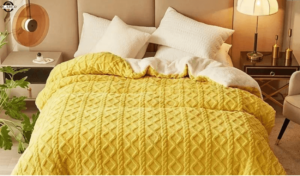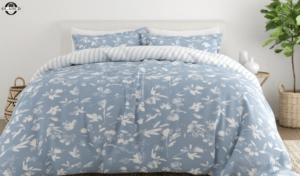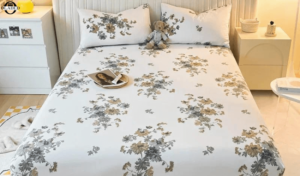Did you ever wake up in the middle of the night drenched in sweat, even if your room is cool and comfortable? The offender may be standing beneath you, or rather, just beneath your nose. Your bedding mostly regulates your body temperature, therefore if it’s not the right fit for you, it might be the cause of those gloomy nights. We’ll look at the possible reasons behind your excessive sweating in this piece, along with some tips for making sure you wake up feeling refreshed and dry.
Thread Count and Breathability
The number of threads woven into one square inch of material is known as the fabric’s thread count. Although softer sheets are frequently linked to greater thread counts, this association may not hold true for all sheets. Quite high thread counts in sheets can actually feel stuffy and retain heat, which makes you sweat. For the best combination of breathability and comfort, a thread count of 300–400 is considered moderate.
Properties That Wick Away Sweat
Sweating is drawn away from the body and dispersed throughout the fabric by moisture-wicking technology, which aims to quickly drain sweat. Moisture-wicking sheets work wonders for keeping you dry and comfortable throughout the night if you sweat a lot when you sleep. To get the greatest possible moisture management, use bedding made of high-performance fabrics like microfiber.
Regulation of Temperature
You have to keep your body temperature at the right level in order to sleep well at night. Overheating and excessive perspiration can be prevented with the use of temperature-regulating bedding. Seek for sheets with characteristics like breathable weaves or phase-change fabrics that adjust to your body’s demands during the night, especially when it comes to managing body temperature.
Intoxicants and Hypersensitivity
Some materials used in sheets can increase the likelihood of perspiration in those who are very sensitive to allergens. Clothing made of polyester and synthetic materials is less breathable than clothing made of natural fibers like cotton or bamboo, which can cause discomfort and excessive sweat. Reduce allergy responses and enhance your sleep quality with hypoallergenic sheets made of certified organic or Oeko-Tex materials.
Laundering and Maintenance
Regular washing and upkeep are crucial if you want to keep your bedding breathable and fresh. Frequent hot water washing of your linen’s aids in the removal of accumulated oils, bacteria, and sweat. Steer clear of fabric softeners and strong detergents since they might leave behind residues that obstruct ventilation. Instead, use gentle, fragrance-free detergents. To aid with any buildup breakdown, think about adding one cup of white vinegar to the wash cycle.
Bedding Accessories and Their Impact
Other bedding components, beyond sheets, significantly influence your sleep environment. Mattress covers can enhance airflow and safeguard against spills. Pillows with breathable covers and supportive materials offer better neck support and minimize heat buildup. Reducing perspiration and controlling temperature are further advantages of duvet covers composed of light, permeable materials.
Factors related to lifestyle
Many variables related to your lifestyle might contribute to excessive sweating while you sleep. It’s crucial to monitor your diet and hydration, as consuming spicy food or alcohol before bedtime can increase body temperature and promote sweating. Additionally, maintaining a cool, comfortable room temperature and humidity level can help prevent night sweats.
Deciding Which Sheets Are Best for Your Needs
It’s important to take your wants and tastes into account while buying sheets. Considering elements such as fabric type, thread count, and moisture-wicking properties is essential. Achieving a comfortable, sweat-free sleep hinges on striking the right balance between breathability and coziness.
Individual References and Testimonials
Experiences in real life might provide important information on the best sheets to use while trying to stop sweating. Numerous consumers have written about their experiences using various kinds of sheets, describing how they’ve kept them dry and cool during the night, which has improved their quality of sleep. When buying sheets for yourself, you may make an educated choice by reading reviews and testimonies.
Top Demanding Luxury Bed Sheets
- Bohemian Bed Skirt – Tassels Bohemia Flannel Bedding Set 2024
- Luxury 7-Piece Cozy Comforter Set – Faux Suede, Deluxe Styling
- Mainstays Teal Medallion 10 Piece Bed in a Bag Bedding Set 2024
- 600TC Bamboo Flowers Botanical Luxury Embroidery Bedding Set 2024
- Luxury Classical Embroidered Bedding Set 300TC Egyptian Cotton Bed Sheet
Expert Recommendations
Dermatologists and sleep experts often offer valuable advice on reducing nighttime perspiration. If you want bedding made of breathable, natural materials like cotton or bamboo, they can advise against synthetic textiles that retain heat and moisture. To further enhance sleep quality and reduce perspiration, consider investing in moisture-wicking bedding and forming healthy sleep habits.
Cost-effective Choices
Luxurious bedding doesn’t have to break the bank. Numerous affordably priced options offer excellent comfort and breathability without compromising quality. Select sheets made of durable, easy-to-maintain materials like cotton or microfiber.
Final Verdict
In conclusion, understanding the factors that contribute to sweating while you sleep, such as sheet material and weave, is crucial. With breathable options like those offered by Olabed, achieving a comfortable and sweat-free night’s sleep is within reach.




